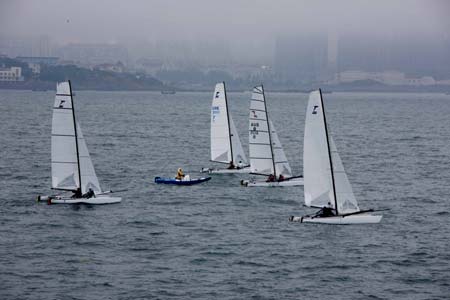
Foreign athletes take trainings at the Olympic sailing
venue off the coast of the Olympic co-host city Qingdao, east China's Shandong
Province yesterday. The algae outbreak off the coast of Qingdao continued to
shrink yesterday as the density of the green weed shrank to 0.5 percent
from 32 percent when it appeared off the coast in early June.- Xinhua
Qingdao has voiced confidence that the Olympic sailing competitions in the
co-host city next month would be a success.
"We have confidence to ensure the success of the events," Xia Geng, the mayor
of Qingdao said in a pep rally one month ahead of the Games.
Preparations in Qingdao had been running smoothly with all the venues already
built and highly praised by the visiting officials from International Organizing
Committee(IOC).
However, the sudden invasion of algae in June had been to some extent
affecting the normal order of the host city.
"It was an unavoidable natural disaster," said Hein Verbruggen, Chairman of
the Coordination Commission of IOC, "but I believe Qingdao can keep their
promise and make the events go on wheels."
CAUSE NO POLLUTION
The algae, namely enteromorpha prolifera, was first detected on May 31 60 sea
miles east off the Dagong Island by the North China Sea Branch of the State
Oceanic Administration and some fishermen working on the sea.
Experts found the algae was exotic which flew from the central region of the
Yellow Sea and would cause no influences on the water quality of the sea off
Qingdao coast.
"The algae will be converted into carbon, generating no toxin during the
process," said Tang Qisheng, ocean-ecological expert with the Chinese Academy of
Engineering.
Zhou Mingjiang, a research fellow with the Institute of Oceanology under the
Chinese Academy of Sciences (CAS), noted that different from the blue-green
algae that grew in polluted water, the algae in Qingdao only grew in clean water
and would not affect people's drinking water.



